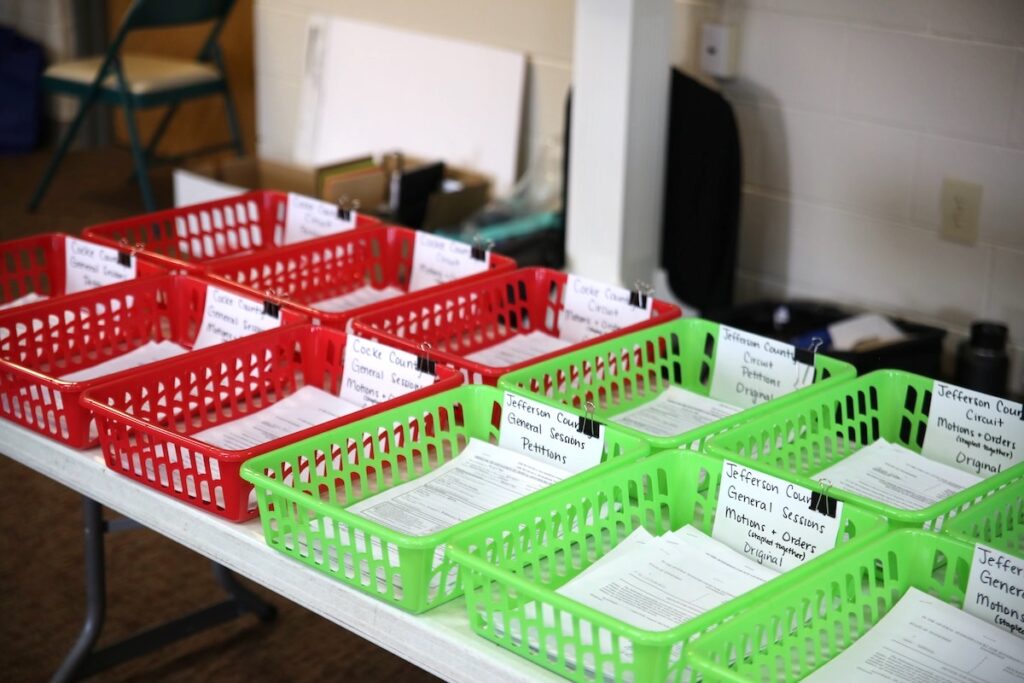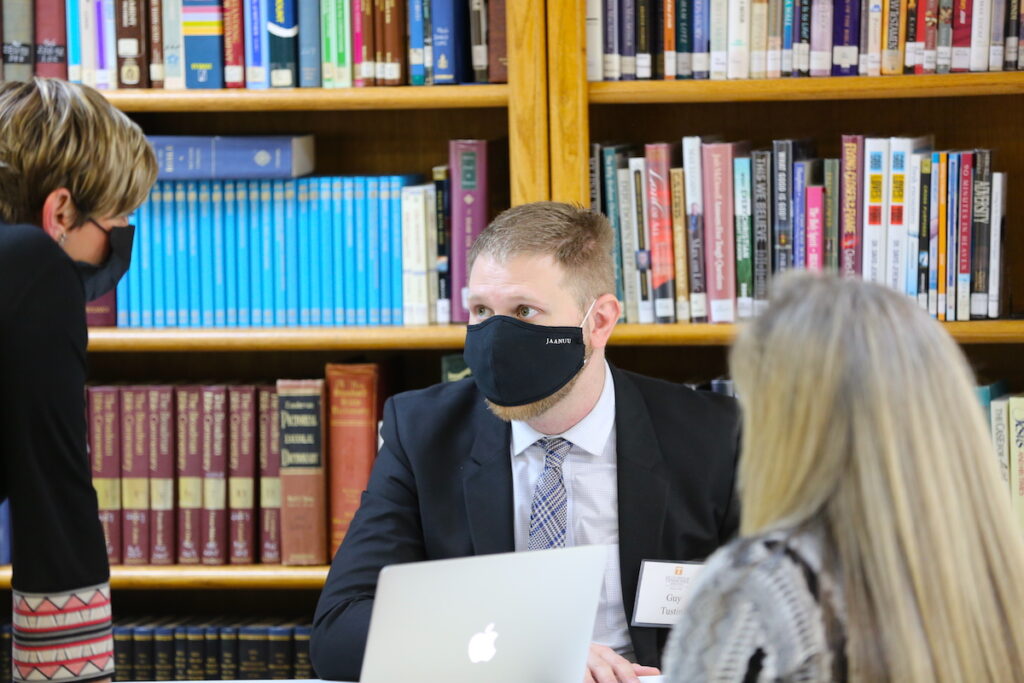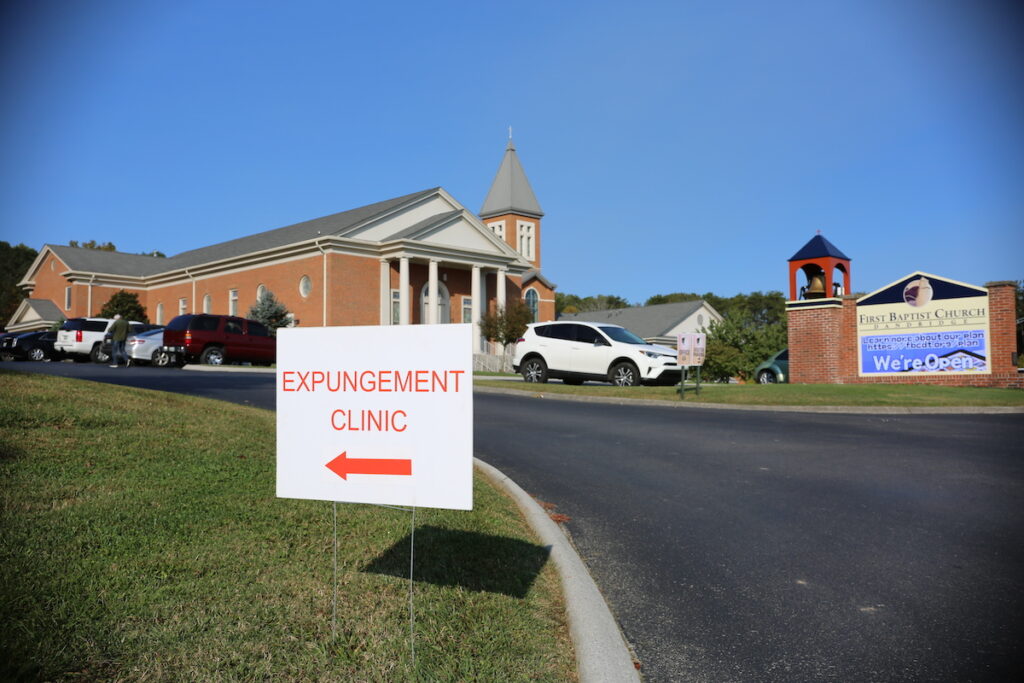In the span of just eight hours, faculty, students and volunteers with the College of Law Legal Clinic helped more than 70 people change their lives.
Some of those people faced suspended driver’s licenses. Some couldn’t secure employment. Some faced legal fees they had no ability to pay.
But when these East Tennessee residents of Cocke and Jefferson counties walked away from the College of Law Legal Clinic’s community court event on Oct. 17, many of their legal problems had been resolved.
“I see myself in a lot of my clients,” said Karla Mendez, a College of Law alumna and ExpungeTN fellow. Mendez, who came to the United States in her early teens and struggled to become a U.S. citizen, worked to organize the event.
“Providing services for those who can’t afford them is a big part of why I wanted to go to law school,” she said.
Mendez, along with the Legal Clinic professors and staff, lawyer volunteers and clinic students began preparing in April for the community court expungement event. The goal was to assist individuals in overcoming their connections to minor criminal activity. Tennessee does not automatically clear – or expunge – the criminal records of individuals who’ve been charged with but not convicted of a crime. Unpaid legal fees can also cause problems for these individuals.
That’s when the Legal Clinic steps in to assist.
Providing services for those who can't afford them is a big part of why I wanted to go to law school.


“Through these sorts of events, we have a unique opportunity to get to know the clients and begin to build relationships with them,” said third-year law student Halle Mann, who represented nine clients throughout the day.
“I went into this wanting to get as much client experience as possible, and it is an amazing thing to be able to stand in front of a judge representing a client while you’re still a law student,” she said. “You can’t get this sort of experience anywhere else.”
In addition to providing students with practical legal experience, the event offered an opportunity for collaboration between the Legal Clinic and the University of Tennessee College of Nursing’s Project Hope program. Tennessee Circuit Judge Duane Slone, a friend of Project Hope who has received national acclaim for his unique efforts in assisting drug-addicted offenders, committed his help and then recruited General Sessions Court Judge Dennis “Will” Roach and Circuit Court Judge Carter Moore to hear cases. Eventually offices of the public defender, district attorney, county clerk and sheriff also agreed to assist.


Project Hope community partners helped spread the word that the community court would take place in October at Dandridge’s First Baptist Church. Within two weeks of the announcement more than 200 people requested assistance, all of the available appointment times had been filled and a waitlist was developed. More than 80 of those clients received assistance in advance of the event and the final count of clients served hit 155.
“It is amazing the level of need we found in this area of Tennessee,” Legal Clinic Director Radice said. “We will be filing hundreds of expungement petitions in these counties where a significant number of dismissals were not expunged.”
One of the challenges of the event, where volunteers were working face-to-face with clients, was determining how to do so safely. Nursing faculty and students developed and enforced COVID-19 safety protocols to ensure masks were worn and safe social distancing was maintained.
Another event partner, Vet to Vet TN, helped manage the logistics of safely assisting clients in and out of the building, creating a safe waiting queue and disinfecting tables and chairs.
“We had nearly as many volunteers as we had clients,” Radice said. “We couldn’t have accomplished what we did without the help of all of our volunteers. This just demonstrates how much we can accomplish when we work together for the good of the community.”
This just demonstrates how much we can accomplish when we work together for the good of the community.”


Offering legal assistance to residents in rural counties became one of the Legal Clinic’s primary areas of focus after it was awarded a $100,000 grant in May 2019 from the Tennessee Bar Foundation. Mendez’s position is funded through that grant and her work includes organizing community court events and developing ExpungeTN, an online resource to help people navigate the legal system.
Third-year law student Guy Tustin, who worked prior to law school in areas of social justice and public health, said the event underscored his desire to use his law degree to influence change for those who face disadvantages.
“Coming to law school to get a degree and make a lot of money was never the point for me,” he said. “It’s always been about what I can do to genuinely help people.
“This has shown me that there needs to be a broader change in the system, especially in rural areas,” he said. “And I can definitely apply what I’m learning in clinic to the goals that I have for social justice.”
